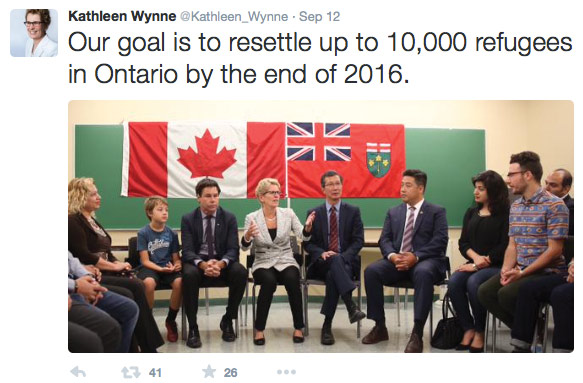Hope away from home
 CREDIT: TWITTER
CREDIT: TWITTERIn a tweet, Ontario Premier Kathyleen Wynne lets Ontarians know that the goal is to resettle up to 10,000 refugees by 2016. Ontario will be providing $10.5 million over two and a half years to support international relief efforts and help more refugees settle in the province according to Wynne's press conference on Sept. 12.
“Ontarians would want to help because our stories are the stories of the people of who we are today,” said Premier of Ontario Kathleen Wynne in a press conference.
Michal Chang, the minister of citizenship and immigration in Ontario described the images of the countless people, the boy whose lifeless body washed ashore, the policemen who threw buns at the crowds. The world saw and is now starting to listen.
“[The photos] were horrible and human beings should not be down treaded or treated in such low levels. Ontarians want to help. It’s not our nature to stand by when others suffer. The ongoing refuge crisis has touched the Ontarians [and] Ontarians want to help both on individual basis and through the government,” said Chang at the Costi, the Greater Toronto Area immigration supporters who help newcomers to Canada settle and prosper.
During the week of Sept. 7, a collective desire to reach out was evident. The Ontario government provided $300,000 to help Syrian refugees settle in Canada. The government of Ontario requested the Federal government to help 5,000 refugees and Ontario promised to accommodate 2,500 of them.
Unlike the plight of refugees in Australia where Tony Abbott’s political wedges are detaining every political asylum seeker, Canada finds it more important to welcome immigrants today, Wynne said.
Every year, thousands of people sail across the Atlantic as refugees and immigrants, fleeing conflicts, in the search of hope. Amidst uncertainty they have found peace in their struggle, have made it to success in their journey, and have found a life free from fear, prosecution and warfare.
Oxfam Canada is operating within Canada focusing on providing clean water to the conflict stricken areas of Syria, which includes rehabilitation of water infrastructure, water trucking and repairing of wells.
It would take a refugee at least 18 months to land here in Canada after filing the paperwork, but that is not the end of a refugee’s struggles. The loan of $10,000 from the government needs to be paid back within a month of arrival.
Though in a positive light, many Syrians in Canada are sponsoring families, helping them find a home away from home through Lifeline Syria, the most accommodating refugee not-for-profit organization operating out of the GTA. Their weekly events educate the willing sponsors to help a family migrate or sometimes sponsor a particular family.
As the Globe and Mail rightly said, “Extraordinary situations need extraordinary responses.” And to the surprise of the Lifeline Syria, the responses are truly extraordinary.
The weekly sponsorship events sell out and they are looking to recruit more volunteers to spread the help. The Syrians are not alone. Their event on Sept. 17 focused on the interests of Canadians looking to sponsor a particular family or provide foster homes to those orphaned in the conflicts.
Howard Adelman, professor emeritus and founder of Operation Lifeline at York University talks with other social scientists in all esteemed Canadian universities to put light on the four-step journey to sail with hopes in Canada.
The most fortunate part of the process is that no determination is required from any country or United Nations Human Commissioner for Refugees (UNHCR) as long as Canada is ready to accommodate them.
Although the actual number of refugees to be accommodated will be determined by the end of the elections in Oct., the number is tentatively set at 25,000 government- assisted and 25,000 privately sponsored refugees.
Canada is trying to accommodate refugees from the countries of first asylum: Jordan, Turkey, Egypt and Lebanon and reducing the life risk of the refugees from embarking the journey to seek asylum in Europe.
The families with children will be given the first priority and then special care will be taken that families are not separated.
The Canadian immigration officers will have offshore offices and the processes have been accelerated for the ones who are sponsored already. Lifeline Syria is trying to work with refugees with the help of private sponsors and other NGOs are working with Syrians in the first asylum countries to minimize their plight during the eighteen months.
Every night millions of exhausted refugees close their eyes with the hopes that the next day will be the day they settle in a land without war, a land with no fear. Organizations, such as Operation Lifeline, help to turn those hopes into a reality.














